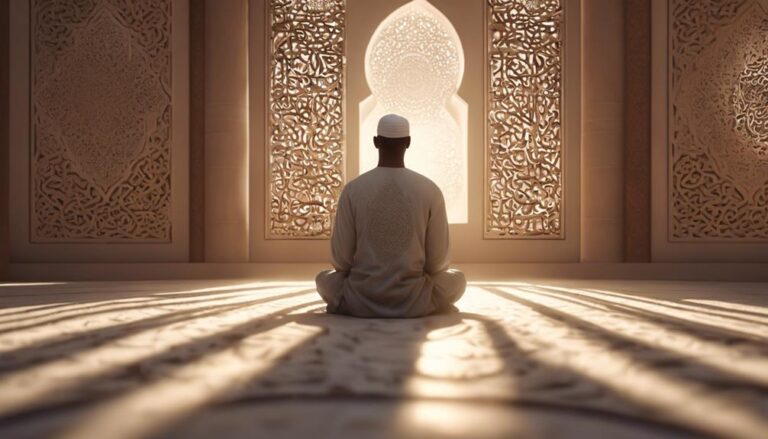The Role of Dhikr Circles in Promoting Mental Well-being
Immerse yourself in the profound tradition of Dhikr circles, where the sacred practice of remembrance invokes a serene and balanced mind. By engaging in Dhikr, you foster a strong spiritual connection and experience communal harmony. These gatherings offer stress relief, mood regulation, cognitive focus, and emotional stability, enhancing your mental well-being. The unity and support found in Dhikr circles promote inner peace and emotional balance. Explore the rich benefits of Dhikr practices for a deeper understanding of how they can positively impact your mental health and spiritual growth.
Key Takeaways
- Dhikr circles provide stress relief and emotional stability.
- Enhance cognitive focus and mental clarity through Dhikr practices.
- Foster social support, unity, and emotional bonds.
- Promote inner peace, spiritual connection, and community bonding.
- Dhikr circles offer a holistic approach to mental well-being.
Origins of Dhikr Circles
The origins of Dhikr circles can be traced back to the early days of Islamic history when small groups of devout individuals gathered regularly to engage in the remembrance of Allah through recitations and prayers. These gatherings hold significant historical importance as they weren't only a means of spiritual connection but also served as a way to strengthen the community's bond with their faith. Dhikr circles were deeply ingrained in the cultural practices of early Muslims, providing a space for communal worship, learning, and reflection. The act of coming together in these circles fostered a sense of unity and solidarity among participants, creating a shared experience of devotion and mindfulness.
Through the centuries, Dhikr circles have continued to play an essential role in maintaining the spiritual fabric of Muslim communities worldwide. The historical significance of these gatherings lies in their ability to preserve traditional practices and teachings while adapting to the evolving needs of the faithful. Cultural practices surrounding Dhikr circles vary across regions, reflecting the diverse ways in which individuals seek spiritual fulfillment and connection with Allah.
Psychological Benefits of Dhikr
Engaging in Dhikr practices can serve as effective stress relief techniques, offering believers a way to calm their minds and find solace in remembrance of the divine. Through regular Dhikr, individuals may experience mood regulation effects, helping them navigate the challenges of daily life with a sense of inner peace and emotional stability.
Additionally, the cognitive focus required during Dhikr circles can enhance concentration and mindfulness, leading to improved mental clarity and overall well-being.
Stress Relief Techniques
Engage in regular sessions of Dhikr to experience the profound psychological benefits of this powerful stress relief technique. Dhikr, or the practice of remembrance of Allah, offers a unique avenue for stress relief by combining mindfulness practice and relaxation techniques.
When you engage in Dhikr circles or individual sessions, you immerse yourself in the repetitive recitation of prayers and phrases, allowing your mind to focus solely on the divine, thereby promoting a state of mindfulness. This focused attention on the divine presence helps in calming the mind, reducing anxiety levels, and promoting a sense of inner peace.
Furthermore, Dhikr serves as a relaxation technique by creating a tranquil environment where you can disconnect from the chaos of daily life and connect with your spiritual self. The rhythmic recitation of sacred words and phrases during Dhikr sessions can have a soothing effect on your mind and body, inducing a state of relaxation and calmness. By incorporating Dhikr into your routine, you can effectively manage stress levels and experience a heightened sense of mental well-being.
Mood Regulation Effects
In the practice of Dhikr, individuals can cultivate a profound sense of emotional balance and stability through the regulation of mood states. Dhikr, or the remembrance of Allah, serves as a powerful tool for emotion regulation, allowing individuals to navigate through various emotional states with greater ease and awareness. Through the repetitive recitation of sacred phrases, individuals engage in a form of meditation that calms the mind and soothes the heart. This process not only helps in managing negative emotions such as anxiety and sadness but also enhances positive emotions like gratitude and contentment.
Moreover, Dhikr promotes mental clarity by providing a focused outlet for individuals to channel their thoughts and feelings towards spiritual reflection. By immersing oneself in the rhythmic recitation of divine phrases, distractions are minimized, and the mind attains a state of heightened awareness and attentiveness. This mental clarity not only aids in mood regulation but also contributes to overall cognitive functioning and mindfulness. Through the practice of Dhikr, individuals can experience a profound sense of emotional well-being and inner peace.
Cognitive Focus Benefits
Dhikr practices facilitate enhanced cognitive focus by centering your thoughts on divine remembrance, fostering a heightened state of mental clarity and attentiveness. Engaging in regular dhikr circles can bring about various cognitive and emotional benefits:
- Cognitive Enhancement: Through the repetition of sacred phrases or prayers, your mind becomes attuned to the spiritual domain, improving concentration and cognitive abilities.
- Concentration Benefits: By focusing on the divine during dhikr, distractions are minimized, allowing for improved concentration on tasks and daily activities.
- Emotional Regulation: The act of dhikr helps in regulating emotions by instilling a sense of peace and tranquility, thereby reducing stress and anxiety levels.
- Mental Clarity Benefits: Dhikr aids in clearing the mind of clutter and negative thoughts, leading to enhanced mental clarity and a more balanced outlook on life.
Incorporating dhikr practices into your daily routine can have profound effects on your cognitive function and emotional well-being, promoting a more harmonious and focused state of mind.
Social Support in Dhikr Circles
As you explore the significance of social support within Dhikr circles, you'll uncover the profound emotional bonds that are cultivated through shared moments of remembrance and reflection.
These circles serve as sanctuaries where individuals can openly express their struggles and find solace in collective supplication.
Through the exchange of coping strategies and the comfort of communal prayers, Dhikr circles offer a supportive environment that nurtures mental well-being and strengthens interpersonal connections.
Emotional Bonds in Circles
Within the intimate confines of Dhikr circles, participants forge emotional bonds that serve as a cornerstone for social support and communal well-being. These circles provide a unique platform for individuals to connect on a deeper level, fostering a sense of belonging and understanding among members.
Here are four key aspects that highlight the significance of emotional bonds in Dhikr circles:
- Trust Building: Through shared spiritual practices and open discussions, participants develop trust in one another, creating a safe space for vulnerability and emotional expression.
- Emotional Support: Members offer each other comfort, empathy, and encouragement, strengthening their emotional resilience and providing a sense of security within the group.
- Unity in Faith: The shared devotion to spiritual practices and beliefs nurtures a sense of unity and solidarity among participants, reinforcing their emotional connections.
- Mutual Respect: Respect for each other's experiences, thoughts, and feelings cultivates a culture of mutual understanding and compassion within the circle.
These emotional bonds not only enhance individual well-being but also contribute to the overall harmony and cohesion within Dhikr circles.
Shared Coping Strategies
Shared coping strategies play a pivotal role in fostering social support and resilience among participants in Dhikr circles, contributing to their overall mental well-being. When individuals come together in Dhikr circles, they often share common challenges and stressors in daily life. By collectively engaging in coping strategies such as reciting specific prayers, reflecting on Quranic verses, or participating in group discussions, members of Dhikr circles create a supportive environment where they can lean on each other for emotional support and guidance. These shared coping strategies not only help individuals navigate the difficulties they face but also strengthen the bonds within the group, fostering a sense of community and belonging.
In times of distress or uncertainty, the communal nature of Dhikr circles provides a platform for individuals to express their emotions openly and seek solace in the shared spiritual practices. This shared experience not only promotes mental health but also encourages a sense of unity and solidarity among participants as they collectively work towards inner peace and well-being.
Dhikr Circles and Stress Reduction
Engaging in Dhikr circles can serve as a beneficial practice for promoting stress reduction and mental well-being among participants. The rhythmic repetition of the names of the Divine can create a calming atmosphere, allowing individuals to focus on spiritual connection rather than worldly stressors.
Here are four ways in which Dhikr circles can aid in stress reduction:
- Focused Attention: Dhikr encourages individuals to concentrate on the present moment, diverting attention from worries and stressors.
- Relaxation Response: The meditative aspect of Dhikr can trigger the body's relaxation response, lowering heart rate and reducing stress levels.
- Community Support: Being part of a Dhikr circle provides a sense of community and belonging, which can alleviate feelings of isolation and stress.
- Spiritual Upliftment: Connecting with the Divine through Dhikr can offer comfort, hope, and a sense of purpose, easing mental burdens and promoting overall well-being.
Incorporating Dhikr circles into one's routine can be a powerful tool for managing stress and nurturing mental wellness.
Enhancing Mindfulness Through Dhikr
By practicing Dhikr, individuals can cultivate a heightened sense of mindfulness, fostering a deeper connection to the present moment and enhancing spiritual awareness. Engaging in Dhikr serves as a powerful mindfulness practice, allowing individuals to center their thoughts on the remembrance of the divine and reflect on their spiritual journey. Through this practice, one can develop a profound sense of inner peace and tranquility, leading to a more balanced mental state.
To further illustrate the benefits of enhancing mindfulness through Dhikr, consider the following table:
| Benefits of Dhikr for Mindfulness | Description | Example |
|---|---|---|
| Increased Focus | Dhikr helps in focusing on the present | Reciting "SubhanAllah" with full attention |
| Emotional Regulation | Dhikr aids in managing emotions | Seeking solace in Dhikr during stress |
| Spiritual Connection | Dhikr deepens spiritual awareness | Feeling closer to the divine through Dhikr |
Through consistent practice of Dhikr, individuals can strengthen their mindfulness, engage in spiritual reflection, and experience a sense of grounding in the present moment.
Dhikr Circles for Inner Peace
To deepen the practice of mindfulness through Dhikr, exploring the concept of Dhikr circles can provide individuals with a communal setting to enhance their inner peace and spiritual connection. Dhikr circles are gatherings where individuals engage in the remembrance of the divine through chanting, recitation, and reflection.
Here's how Dhikr circles can benefit your inner peace and spiritual connection:
- Community Support: Being part of a Dhikr circle allows you to connect with like-minded individuals who share the goal of spiritual growth, providing a sense of community and support.
- Enhanced Focus: Engaging in Dhikr practices within a circle can help in maintaining focus and concentration, aiding in relaxation and inner peace.
- Shared Energy: The collective energy generated during Dhikr circles can create a powerful spiritual atmosphere that enhances your own connection with the divine.
- Guided Practices: In Dhikr circles, experienced leaders often guide the sessions, offering structured relaxation techniques and spiritual teachings to deepen your experience.
Connection and Unity in Dhikr
Connection and Unity in Dhikr deepen the spiritual bonds among participants, fostering a sense of collective devotion and harmony within the circle. Through the rhythmic recitation of sacred phrases, participants in a Dhikr circle experience a profound sense of unity and connection with one another.
This shared spiritual practice not only strengthens individual faith but also nurtures a communal bond based on the shared pursuit of spiritual growth. As participants engage in Dhikr together, they synchronize their hearts and minds towards a common goal of seeking closeness to the Divine.
This collective focus cultivates a supportive environment where each member can draw strength from the group's energy and devotion. The sense of unity and connection experienced during Dhikr circles transcends individual differences and fosters a deep sense of belonging to a spiritual community.
In this way, Dhikr circles play an essential role in promoting spiritual growth by nurturing a shared sense of purpose and devotion among participants.
The Future of Dhikr Circles
In contemplating the future of Dhikr circles, it becomes evident that evolving practices and technological advancements may shape the way these spiritual gatherings continue to foster communal devotion and unity. As you look ahead to what lies in store for Dhikr circles, consider the following points:
- Community Growth: Dhikr circles may expand beyond physical locations, utilizing online platforms to reach a wider audience and facilitate connections among individuals globally.
- Spiritual Development: Modern adaptations in Dhikr circles could incorporate innovative methods to enhance participants' spiritual growth and understanding of Islamic principles.
- Cultural Relevance: Dhikr circles may evolve to embrace diverse cultural expressions while staying true to the core teachings of Islam, ensuring relevance and inclusivity for all participants.
- Technological Integration: The integration of technology in Dhikr circles could streamline organizational aspects, making it easier to coordinate events and resources for the benefit of the community.
Embracing these potential changes can lead to a more vibrant and impactful future for Dhikr circles, fostering both spiritual enrichment and community cohesion.
Conclusion
To sum up, engaging in Dhikr circles can have a profound impact on your mental well-being. By participating in the remembrance of God with others, you can experience psychological benefits, reduce stress, enhance mindfulness, and cultivate inner peace.
These circles provide social support, foster connection and unity, and offer a sense of belonging. Embracing the practice of Dhikr in a communal setting can help you navigate the challenges of life and find solace in the remembrance of the Divine.
So, don't wait any longer, join a Dhikr circle today and start on a journey towards inner peace and spiritual growth.







